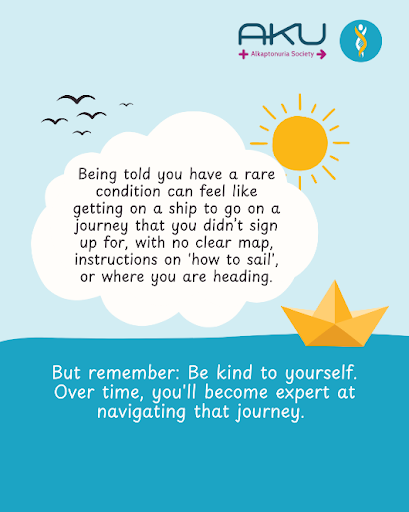Alkaptonuria (AKU) is a rare genetic condition that affects 1 in 250,000 to 500,000 people globally. Caused by a missing enzyme that breaks down a substance called homogentisic acid (HGA), AKU leads to the darkening of bones and cartilage, and can cause joint damage, heart issues, and a host of physical complications. But what often gets overlooked is the invisible toll AKU takes-not on the bones or tissues, but on the mind and soul.
We’re proud to collaborate with Rareminds, a specialist mental health charity within the rare disease community. Their work places a vital focus on emotional wellbeing, and their comprehensive Wellbeing Hub offers a wealth of resources tailored for individuals living with rare conditions.
Much of the insight shared in this blog draws on information from Rareminds’ website and wellbeing hub, alongside thoughtful advice and tips they’ve kindly provided. To begin, let’s explore some of the complex emotions that people with AKU may experience-and how self-care can play a meaningful role in managing them.





The Weight of the Wait
For many people living with AKU, the path to diagnosis is long and winding. Some patients spend years, even decades, navigating a maze of misdiagnoses and medical confusion. During this time, they’re not only managing unexplained pain and fatigue, they’re also caught in limbo, seeking answers while life feels like it’s on hold.
Each unanswered question, each inconclusive test result, and every month spent anticipating the next appointment adds another layer of emotional strain. Even after a diagnosis is finally made, the challenges persist: delays in accessing treatments like nitisinone, slow-moving specialist referrals, and the ongoing struggle for recognition in a healthcare system where AKU remains widely misunderstood. These prolonged gaps in care can leave individuals feeling forgotten and forsaken.
The uncertainty of waiting for test results can be particularly draining, especially when living with a rare condition. According to guidance from the Rareminds website, it can help to clarify when you’ll receive your results and how they’ll be shared- reducing some of the ambiguity. They also suggest using calming strategies to manage the anxiety of not knowing and being careful about where you turn for information- sticking to trusted, official sources if you choose to research online. Night-time, when worries often intensify, can be especially difficult, so Rareminds encourages practicing extra self-kindness and care during these hours.
Isolation in Plain Sight
AKU is a rare disease. That rarity brings a particular kind of loneliness. Many patients may go years without ever meeting someone else who shares their condition, which can leave them feeling misunderstood or unseen.
At the National Alkaptonuria Centre (NAC) in Liverpool, patients in the UK are invited to attend annual check-ups and tests in small groups, typically made up of around five people. At the AKU Society, we’ve heard firsthand how powerful these group visits can be. They provide a rare opportunity for patients to connect, share their stories, and speak openly with others who genuinely understand what they’re going through.
We know how fortunate we are to have this model of care in the UK. In many parts of the world, people living with AKU may never have the chance to connect with others like them.
“Patients tell us that one of the most valuable aspects of support we facilitate, is the opportunity for them to get together and spend time with each. It gives them a chance to share experiences, make friends, and be with others who really understand what it is like to have AKU”. Hannah Dwyer – Head of Patient Welfare & Support
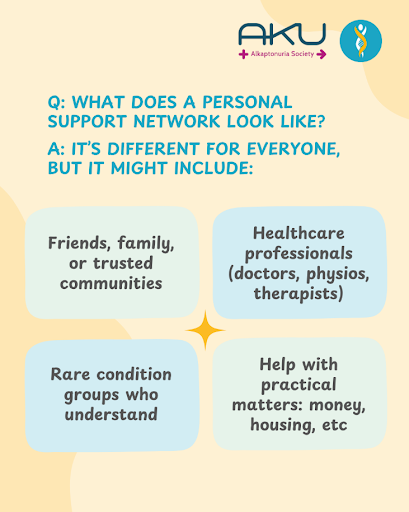
However, even within the healthcare system, people with AKU may encounter professionals who have never heard of the condition. This often means they must become their own advocates, explaining their diagnosis, managing complex symptoms, pushing for treatment, and justifying their experience to those who may not fully understand. The emotional toll of this constant self-advocacy is immense. It’s not just exhausting, it can feel deeply isolating.
One tool we recommend at the AKU Society to help ease this burden is the CamRare Patient Passport. Think of it as your medical “cheat sheet”, a small but powerful document that speaks for you when you’re too tired to explain everything again. It includes essential information such as your diagnosis, medications, emergency details, and key care needs, all summarised in a format that fits neatly in your bag, pocket, or on a lanyard.
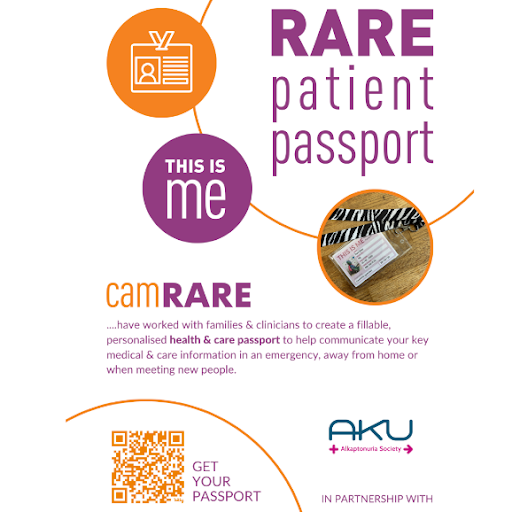
The Quiet Toll of Chronic Pain
Pain in AKU is more than a physical symptom. It’s a daily burden that quietly wears down both body and mind. Over time, chronic pain can erode energy, affect mood, and cloud concentration, making even the simplest tasks feel overwhelming.
But with the right tools, it is possible to regain a sense of control. The Pain Toolkit, developed by people with lived experience of persistent pain, offers practical, down-to-earth strategies that can make a real difference.
One of its core principles is pacing. This means learning how to balance activity and rest to avoid the “boom and bust” cycle, where doing too much on a good day leads to a painful crash. Pacing involves breaking tasks into manageable chunks, taking regular breaks, and stopping before pain flares up. For someone with AKU, this might look like resting between steps while cooking or spreading household chores across several days.
Another key strategy is setting realistic goals. When chronic pain shrinks your world, small, achievable goals can help restore a sense of purpose. This might mean taking a short walk, preparing a simple meal, or spending ten minutes on a favourite hobby. The important part is not how big the goal is, but that it’s meaningful to you. Celebrating progress, however small, and avoiding comparisons with your “before” self can take time, but it’s a powerful act of self-care.
Above all, the Pain Toolkit reminds us that asking for support is a strength, not a weakness. These small shifts, when practiced consistently, can help people with AKU manage pain with greater confidence, balance, and self-compassion.
If you’re curious to explore more, the Pain Toolkit is packed with videos, podcasts, real-life interviews, research, and resources for both patients and professionals. Topics include movement, self-care, emotional wellbeing, and much more.
Loss, Identity, and the Grief No One Sees
For people living with Alkaptonuria (AKU), the physical changes are just one part of the story. Over time, the condition can quietly reshape a person’s world. Activities that once brought joy, like walking the dog, gardening, or playing with grandchildren, might become painful or impossible. Careers can be disrupted or even cut short, appearances such as height can change, and everyday independence may slowly slip away. These practical losses often carry deep emotional weight: grief for the parts of life that are no longer possible, frustration at the limitations imposed by the condition, and sometimes guilt for needing more support than before.
This type of grief can be hard to talk about. It doesn’t come with a single event or endpoint. Instead, it builds gradually, as changes unfold over months or years. Because it’s not always recognised by others, it can feel invisible, and that invisibility can make the emotional burden even heavier. But the grief is real. It touches more than just what someone can or can’t do- it reaches into their identity, their sense of purpose, and how they see themselves.
As Rareminds notes, validating your feelings, instead of judging them, is one of the most important steps in coping. You might find yourself thinking, “I shouldn’t feel this upset,” or “Other people have it worse.” But accepting how you feel is not the same as liking those feelings. It simply means recognising that your emotions make sense given everything you’re dealing with.
Having someone else acknowledge your loss- whether it’s a doctor, family member, or friend, can be incredibly reassuring. But even if others don’t fully understand, you can still offer yourself that same validation. Try asking: What would I say to a friend in my shoes? Chances are, you’d offer them kindness and compassion. You deserve the same.
Self-kindness also means giving yourself time. Adjusting to change isn’t linear, and it doesn’t happen overnight. You might feel like you’re doing “okay” one day and feel overwhelmed the next. That’s completely normal.
When it comes to support, don’t be afraid to be specific. People often want to help but don’t know how. Letting someone know exactly what would ease your burden can turn vague offers into real support.
And think carefully about who helps and how. Some people are great at listening and offering emotional support. Others might be better at helping with the shopping, cooking, or childcare. Knowing who in your life can help practically, emotionally, or both can help you avoid disappointment and feel more supported overall.
Living with AKU brings real, often invisible grief. But that grief deserves recognition and so do you.
Exhaustion Beyond Tiredness
Living with AKU means navigating far more than symptoms. It means managing appointments, medications, advocacy, and uncertainty-all while dealing with pain and fatigue. But the tiredness people feel often goes beyond the physical. It’s a deep, emotional exhaustion that comes from having to explain yourself repeatedly, push for treatment, and face barriers in care. It’s the kind of fatigue that settles into the bones-a weariness that isn’t solved by a good night’s sleep, but by understanding, support, and being believed. To better understand the emotional impact of living with a rare condition, we spoke with Rareminds about why prioritising wellbeing is so important.
Advice around wellbeing from Rareminds:
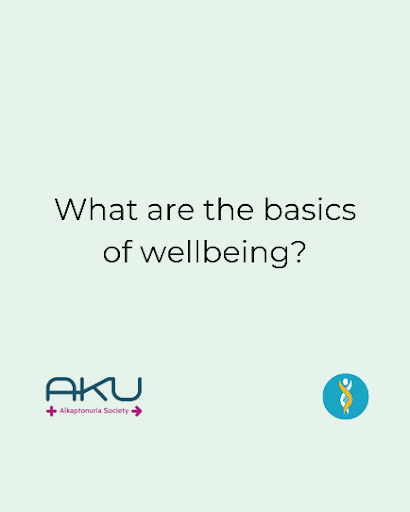
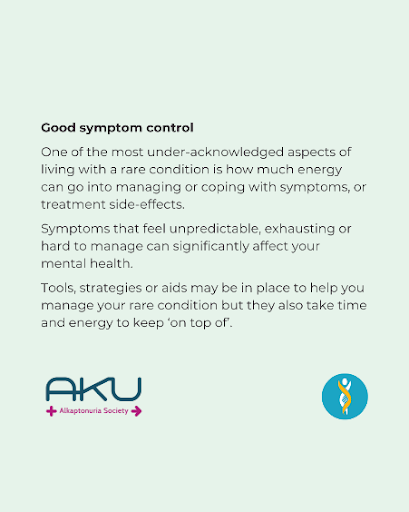
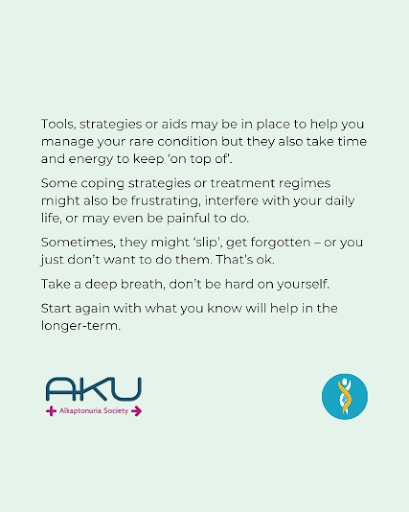
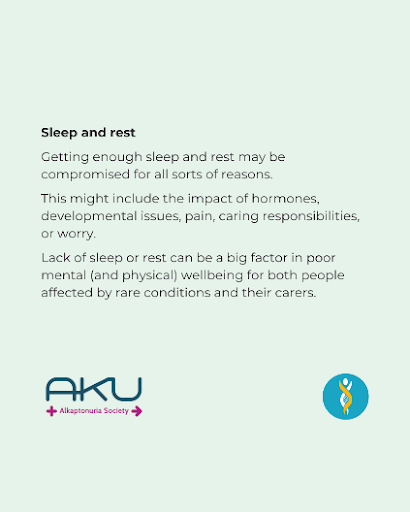
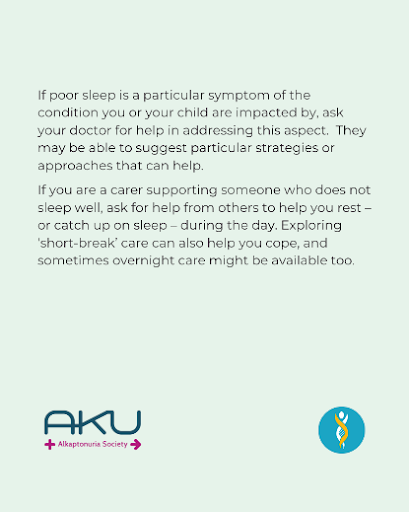
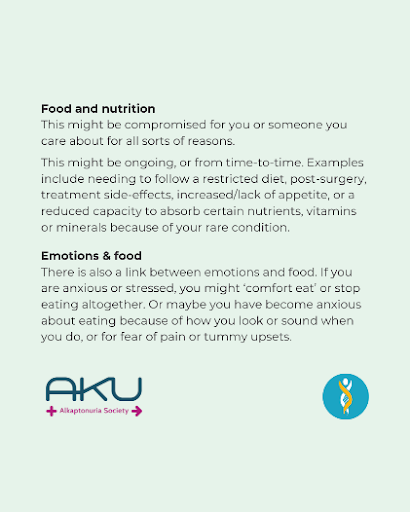
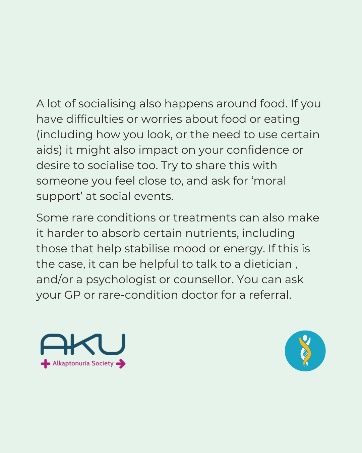
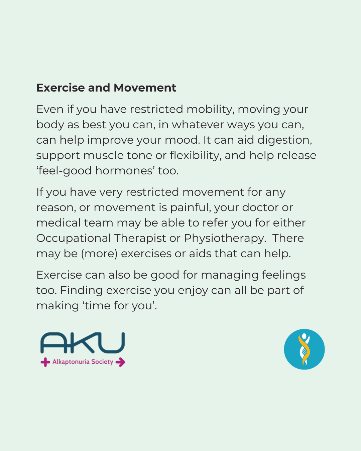
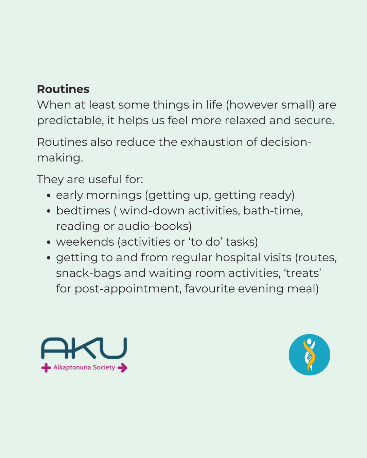
Support with Your AKU
Living with AKU can feel isolating at times, but you don’t have to face it alone. Building a strong support network, whether that’s emotional, practical, or medical, is a vital part of navigating life with a rare condition.
Reaching out for help isn’t a sign of weakness; it’s a way to protect your mental health, feel understood, and share the load. Whether you need advice about managing symptoms, a space to talk about how you’re feeling, or help navigating treatment options, support is available.
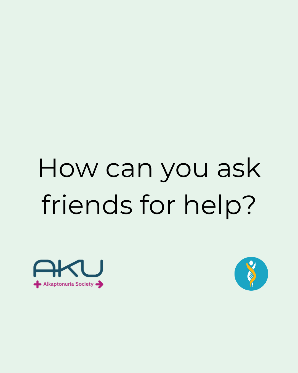

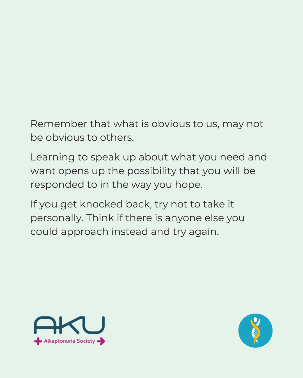
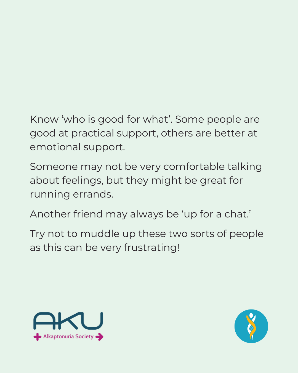

Connect with the AKU Society
The AKU Society is here for you. We provide information, peer support, and advocacy to help you live well with AKU. Whether you have a question about treatment or just need someone to talk to, we’re only a message or email away (info@akusociety.org).
Access Emotional Support with Rareminds
Rareminds offers specialist counselling tailored to people living with rare diseases. Their trained therapists understand the unique emotional challenges rare patients face-including uncertainty, grief, and burnout.
Even if AKU makes you feel different or invisible at times, there are people and communities who see you and want to help. Whether it’s talking to a loved one, connecting with others online, or speaking to a therapist, these small acts of support can have a big impact.
Resources
- Rareminds wellbeing hub: https://www.rareminds.org/wellbeing-hub/
- Rareminds podcast: https://open.spotify.com/show/7zZW5FkT2JxQrupFEzJbKG
- Rareminds counselling: https://www.rareminds.org/services/counselling-services/
- Pain toolkit: https://www.paintoolkit.org/resources/toolkits
- CamRare patient passport: https://www.camraredisease.org/patient-passport/

